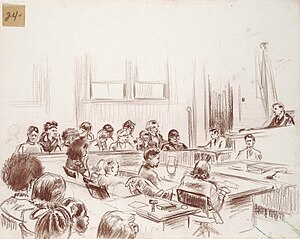Pro hac vice

Pro hac vice (English: /proʊ hæk ˈviːtʃeɪ/), Latin: "for this occasion" or "for this event" (literally, "for this turn"),[1] is a legal term usually referring to a practice in common law jurisdictions, whereby a lawyer who has not been admitted to practice in a certain jurisdiction is allowed to participate in a particular case in that jurisdiction.[2] Although pro hac vice admission is available in every American jurisdiction,[3] civil law jurisdictions generally have much stricter rules for multi-jurisdictional practice.[4]
Origins
The origins of the doctrine of admission pro hac vice have been traced as far back as the year 1629 in the English Court of Common Pleas.[5] The doctrine appeared in America as early as the year 1735 in the New York trial of John Peter Zenger for libel, when the Philadelphia attorney Andrew Hamilton was permitted to appear in on Zenger's behalf.[3] By 1876, the custom had become "general and uniform" in the United States.[6]
Modern application in common law jurisdictions
The right to appear pro hac vice is not guaranteed, and 50-state surveys have shown that "most jurisdictions intend for pro hac vice admission to be used on a sparing and occasional basis."[3] Generally, the attorney who requests authorization to practice in a jurisdiction within which he or she is not licensed must specifically request permission from the court to be able to appear as an attorney of record.[3] This is accomplished with a motion to appear pro hac vice, in which an attorney who is licensed in the jurisdiction requests that the non‐licensed attorney be admitted to practice in a particular case.[3] In addition to the motion, the out-of-jurisdiction attorney is typically required to provide the court with a statement from his local bar association indicating that he is a member in good standing and also pay a small fee to the court or its local bar association. For example, there is a $25 annual fee in the United States District Court for the District of Delaware,[7] and the United States District Court for the Southern District of New York charges a $200 fee to file a motion for admission pro hac vice.[8]
Additionally, in maritime law, a demise charterer is considered the owner pro hac vice for limited liability purposes, whereas time or voyage charterers are not.[9]
Other uses
The expression is also used in the Catholic Church when a titular diocese becomes the title of an archbishop rather than of a bishop. Similarly, when a Cardinal-Deacon is promoted to Cardinal-Priest he usually retains his titular deaconry. This deaconry is then said to be elevated pro hac vice to the rank of a titular church. When referring to a titular diocese or titular deaconry which once was elevated pro hac vice but by now has reverted to its original rank the term pro illa vice is used in church documents.
References
- ^ Black's Law Dictionary (8th Ed.)
- ^ Scott J. Goldstein, Constitutional Law: Attorney Not Entitled to Hearing upon Denial of Admission Pro Hac Vice, 44 Mo. L. Rev. 772, 773 (1979) (discussing common law origins of doctrine)
- ^ a b c d e Legal Information Institute, Cornell University Law School (Accessed July 13, 2015) (discussing existence of pro hac vice statutes in all fifty states)
- ^ See, e.g., Ruggero J. Aldisert, Rambling Through Continental Legal Systems, 43 U. Pitt. L. Rev. 935, 945 (1982) (observing that in Germany, "simultaneous admission to the Amtsgericht (Justice of the Peace) and to the Landgericht (trial court of general jurisdiction) is permitted, but simultaneous admission to two Landgerichte is possible only in exceptional cases.")
- ^ Scott J. Goldstein, Constitutional Law: Attorney Not Entitled to Hearing upon Denial of Admission Pro Hac Vice, 44 Mo. L. Rev. 772, 773 (1979); see also Cooper v. Hutchinson, 184 F.2d 119, 124 (3d Cir. 1950) (citing Thursby v. Warren, 4 Car. 1 79 Eng.Rep. 738 (C.P. 1629))
- ^ Cooper v. Hutchinson, 184 F.2d 119, 122 (3d Cir. 1950) (internal citations omitted)
- ^ United States District Court for the District of Delaware, Pro Hac Vice (Accessed July 13, 2015).
- ^ United States District Court for the Southern District of New York, District Court Fee Schedule and Related Information (Accessed July 13, 2015)
- ^ Roman T. Keenan, Charter Parties and Bills of Lading, 42 Marquette L. Rev. 346 (1959)
External links
- Example on Groklaw
